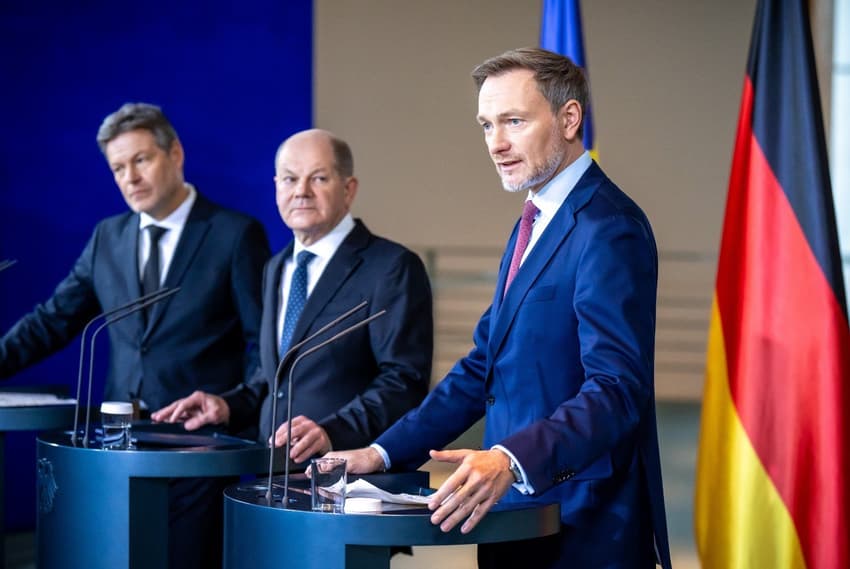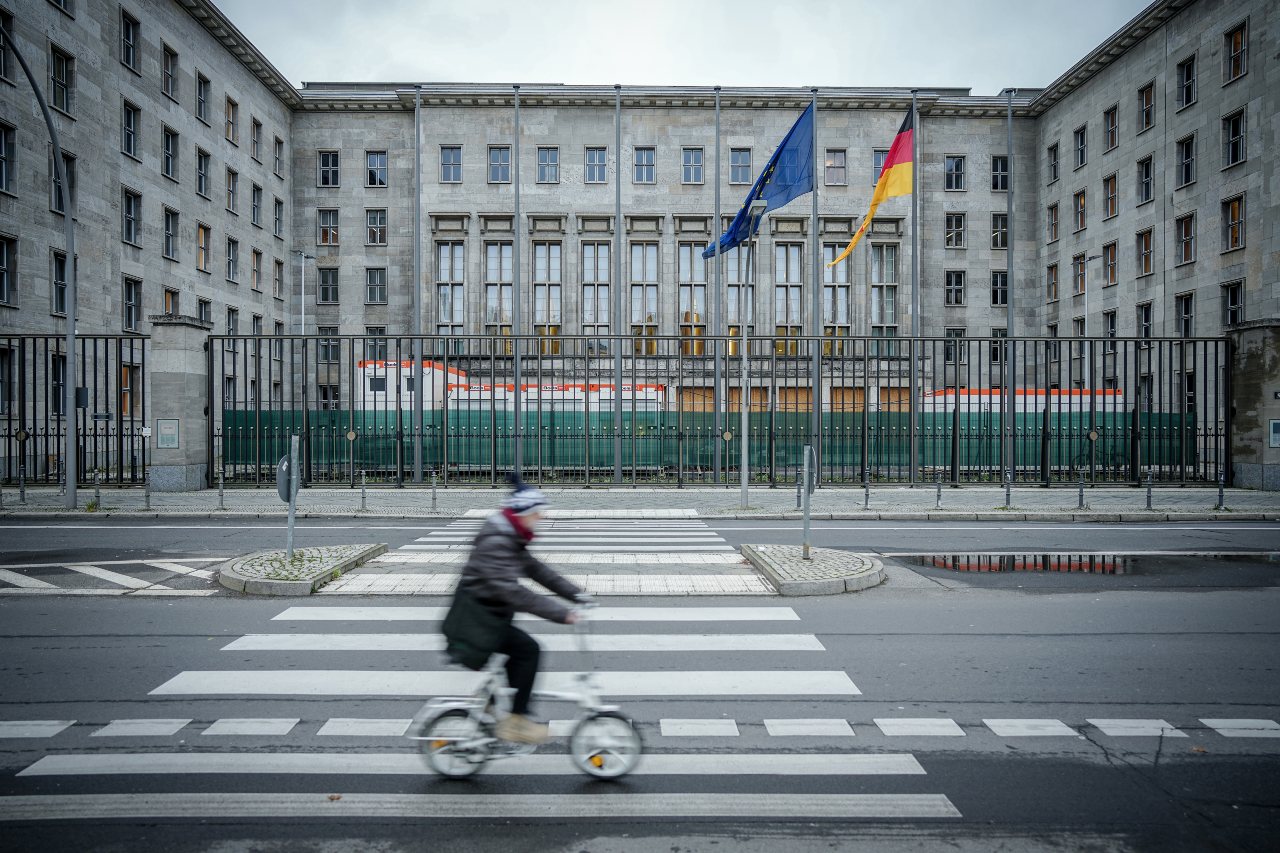Germany's debt limit returns as coalition makes deal to end budget crisis

German Chancellor Olaf Scholz's coalition clinched a last-minute budget deal on Wednesday, preventing a political crisis from spiralling out of control after a constitutional court ruling upended its spending plans.
Savings would have to be made in some areas, Scholz conceded, but he pledged that Berlin would maintain financial aid for Ukraine in its battle against Russia, adding that he would also fight for "sustainable" EU help for Kyiv.
Germany's highest court had last month found that the government had broken a constitutional debt rule when it transferred €60 billion earmarked for pandemic support to a climate fund.
The bombshell ruling blew a huge hole in spending plans and plunged Scholz's three-way coalition into turmoil.
After adopting an emergency budget for 2023, Scholz and his junior coalition partners had battled for weeks before finally finding an agreement for 2024.
The coalition's new plans would allow Germany to keep to its funding commitments for Ukraine, as well as plans to transition to climate neutrality.
READ ALSO: Will Germany's strict debt rule be reformed?
It will also maintain its welfare pledges, said Scholz.
Germany will also reinstate its debt brake rule, which is enshrined in national law and prevents the state from borrowing more than 0.35 percent of annual GDP to cover a structural deficit, barring exceptional circumstances.
To make up the €17 billion gap exposed by the court ruling, Scholz said "climate-harming subsidies" will be dropped.
But help for the solar energy sector, as well as incentives to get consumers to switch to electric cars, will also be hit, admitted Economy Minister Robert Habeck of the Greens.
The crisis came at a time when the German economy was already struggling and the budget compromises immediately sparked criticism.
"The savings coming at a time of economic weakness will have a negative impact on the economy," Gerd Landsberg of the federation of German cities and towns told Rheinische Post daily.
ING analyst Carsten Brzeski projected that the more "restrictive" budget in 2024 means that "the risk is high that the German economy will remain in a minor recession next year".
Balanced budget obsession?
The debt rule, which came into force in 2011 under former chancellor Angela Merkel, was meant to underline Germany's commitment to fiscal prudence.
With an ageing population, the conservatives have argued that overburdening younger generations with more borrowing would be irresponsible.
READ ALSO: Schuldenbremse: What is Germany's debt brake and how does it affect residents?
Critics however view the rule as a German obsession that is halting the EU heavyweight's growth potential. At a time when Europe's biggest economy is already at risk of a recession, calls have been growing for Berlin to open its coffers wider.
The rule had been suspended since 2020 because of the coronavirus pandemic and an energy crisis triggered by Russia's war on Ukraine.

A cyclist passes the Federal Finance Ministry in central Berlin. Photo: picture alliance/dpa | Kay Nietfeld
The debt brake had been due to return this year until the court ruling forced the government to temporarily halt the rule again for 2023.
Scholz's Social Democrats had called for a renewed suspension in 2024 to allow for more spending, according to a resolution adopted unanimously at its party congress on Saturday. But Lindner's liberal FDP firmly rejected such a move.
Instead, the FDP and the opposition conservatives wanted reductions on welfare spending, something Scholz categorically rejected on Saturday, while Habeck had separately insisted that "all projects that we have conceived" must go ahead.
Amid the standoff, Scholz's SPD parliamentary group admitted earlier this week that it would no longer be possible for parliament to adopt 2024's budget this year.
With the political deal now in hand, Scholz and his coalition will put the plans to parliament in early 2024.
Comments
See Also
Savings would have to be made in some areas, Scholz conceded, but he pledged that Berlin would maintain financial aid for Ukraine in its battle against Russia, adding that he would also fight for "sustainable" EU help for Kyiv.
Germany's highest court had last month found that the government had broken a constitutional debt rule when it transferred €60 billion earmarked for pandemic support to a climate fund.
The bombshell ruling blew a huge hole in spending plans and plunged Scholz's three-way coalition into turmoil.
After adopting an emergency budget for 2023, Scholz and his junior coalition partners had battled for weeks before finally finding an agreement for 2024.
The coalition's new plans would allow Germany to keep to its funding commitments for Ukraine, as well as plans to transition to climate neutrality.
READ ALSO: Will Germany's strict debt rule be reformed?
It will also maintain its welfare pledges, said Scholz.
Germany will also reinstate its debt brake rule, which is enshrined in national law and prevents the state from borrowing more than 0.35 percent of annual GDP to cover a structural deficit, barring exceptional circumstances.
To make up the €17 billion gap exposed by the court ruling, Scholz said "climate-harming subsidies" will be dropped.
But help for the solar energy sector, as well as incentives to get consumers to switch to electric cars, will also be hit, admitted Economy Minister Robert Habeck of the Greens.
The crisis came at a time when the German economy was already struggling and the budget compromises immediately sparked criticism.
"The savings coming at a time of economic weakness will have a negative impact on the economy," Gerd Landsberg of the federation of German cities and towns told Rheinische Post daily.
ING analyst Carsten Brzeski projected that the more "restrictive" budget in 2024 means that "the risk is high that the German economy will remain in a minor recession next year".
Balanced budget obsession?
The debt rule, which came into force in 2011 under former chancellor Angela Merkel, was meant to underline Germany's commitment to fiscal prudence.
With an ageing population, the conservatives have argued that overburdening younger generations with more borrowing would be irresponsible.
READ ALSO: Schuldenbremse: What is Germany's debt brake and how does it affect residents?
Critics however view the rule as a German obsession that is halting the EU heavyweight's growth potential. At a time when Europe's biggest economy is already at risk of a recession, calls have been growing for Berlin to open its coffers wider.
The rule had been suspended since 2020 because of the coronavirus pandemic and an energy crisis triggered by Russia's war on Ukraine.

The debt brake had been due to return this year until the court ruling forced the government to temporarily halt the rule again for 2023.
Scholz's Social Democrats had called for a renewed suspension in 2024 to allow for more spending, according to a resolution adopted unanimously at its party congress on Saturday. But Lindner's liberal FDP firmly rejected such a move.
Instead, the FDP and the opposition conservatives wanted reductions on welfare spending, something Scholz categorically rejected on Saturday, while Habeck had separately insisted that "all projects that we have conceived" must go ahead.
Amid the standoff, Scholz's SPD parliamentary group admitted earlier this week that it would no longer be possible for parliament to adopt 2024's budget this year.
With the political deal now in hand, Scholz and his coalition will put the plans to parliament in early 2024.
Join the conversation in our comments section below. Share your own views and experience and if you have a question or suggestion for our journalists then email us at [email protected].
Please keep comments civil, constructive and on topic – and make sure to read our terms of use before getting involved.
Please log in here to leave a comment.